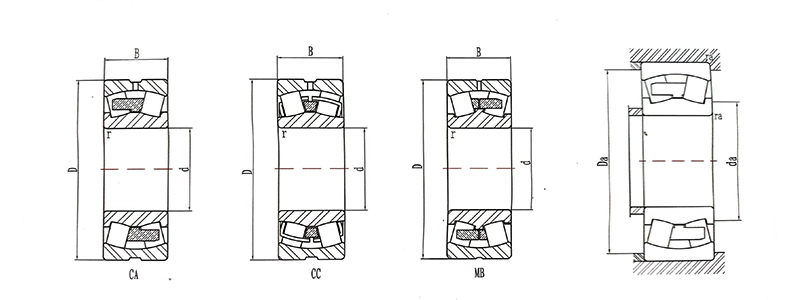Oct . 22, 2024 03:43 Back to list
Choosing the Right Lubricants for Electric Motor Bearings and Manufacturers Guide
Lubricating Electric Motor Bearings Essential Insights for Manufacturers
In the world of electric motors, the efficiency and longevity of operation often hinge on one critical component the bearings. Electric motor bearings are designed to support the rotating shaft, allowing for smooth movement while minimizing friction. However, without proper lubrication, these bearings can quickly wear down, leading to increased operational costs and potential failure of the motor. Therefore, understanding the lubricating requirements for electric motor bearings is essential for manufacturers aiming to enhance performance and reliability.
Importance of Lubrication
Lubrication serves several primary functions in electric motor bearings. First and foremost, it reduces friction between moving parts, which is crucial for maintaining optimal performance. Without adequate lubrication, friction generates heat, leading to increased wear on the bearings and the risk of catastrophic failure. Additionally, lubricant helps to seal out contaminants such as dust and moisture, further protecting the bearing surfaces.
Moreover, proper lubrication facilitates smoother operation, which can enhance energy efficiency. Motors that run more smoothly require less energy, contributing to reduced operational costs. In environments where motors are continually running, such as manufacturing plants, a well-lubricated bearing can significantly extend the lifespan of the entire motor assembly.
Types of Lubricants
Manufacturers are presented with various options when it comes to selecting lubricants for electric motor bearings
. The main types include1. Oil Traditional oil lubricants are commonly used due to their ability to circulate within the bearing and remove heat. They can be either mineral or synthetic oils, each offering distinct advantages in terms of thermal stability and lubrication properties.
2. Grease Bearing grease is another popular option, particularly for applications where the bearing seal is impermeable. Grease provides excellent lubrication and helps prevent the ingress of contaminants. It offers convenience, as it requires less frequent application compared to oil.
3. Solid Lubricants In specific applications where conventional lubricants may fail (such as extreme temperatures or vacuum environments), solid lubricants like graphite or molybdenum disulfide can be employed. These materials reduce friction without the need for a liquid lubricant.
lubricating electric motor bearings manufacturers

Best Practices for Lubrication
To maximize the effectiveness of lubrication in electric motor bearings, manufacturers should adhere to best practices
1. Choose the Right Lubricant Selecting the appropriate lubricant is paramount. Factors such as temperature range, speed, load conditions, and environmental contaminants should inform the choice of oil or grease. Consulting manufacturer specifications and adhering to industry standards can guide lubricant selection.
2. Establish a Maintenance Schedule Regular maintenance and monitoring of lubrication levels are critical. A proactive approach can uncover potential issues before they escalate, ensuring that machines operate efficiently. Depending on the application, this may involve routine checks for lubricant levels, contamination, and overall bearing condition.
3. Apply Adequate Amounts Ensure that the lubricants are applied in sufficient quantities. Over-lubrication can lead to increased heat and pressure, while under-lubrication causes friction, wear, and failure. Understanding the right quantity for specific applications is crucial.
4. Consider Environmental Conditions The operating environment can significantly impact lubrication. In dusty or humid conditions, sealed bearings with grease may be preferable. Conversely, in high-temperature applications, synthetic oils with high thermal stability can be beneficial.
5. Stay Updated on Technology Advances in lubricants and lubrication technology continue to emerge. Manufacturers should stay informed about new products that promise enhanced performance and efficiency, which can lead to improved motor longevity.
Conclusion
For electric motor manufacturers, understanding the intricacies of lubricating motor bearings is an essential aspect of ensuring product reliability and efficiency. Effective lubrication not only prolongs bearing life but also optimizes the overall performance of electric motors. By selecting the right lubricants, following maintenance best practices, and considering the specific operating conditions, manufacturers can significantly enhance the lifespan and efficiency of their electric motor products. As technology and standards evolve, remaining knowledgeable about lubrication strategies will be vital to maintaining a competitive edge in the industry.
Latest news
-
Durable PLC 110-190 Spherical Roller Bearing for Mixer Reducer
NewsAug.26,2025
-
CSK-2RS Sprag Clutch One Way Bearing: Sealed, High Torque, Durable
NewsAug.25,2025
-
CKZ-D Series One Way Overrunning Clutch: Reliable Power Control
NewsAug.24,2025
-
203KRR3 Round Bore Series Bearings | Cylindrical Outer Ring, Precision
NewsAug.23,2025
-
Top Spherical Roller Bearing Material Exporter - High Performance
NewsAug.22,2025
-
Durable UCFC202-09 Round Flange Housing 4-Bolt Ball Bearing
NewsAug.21,2025